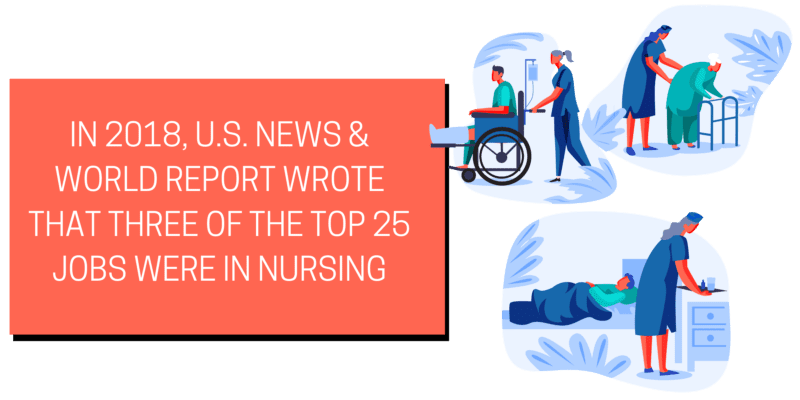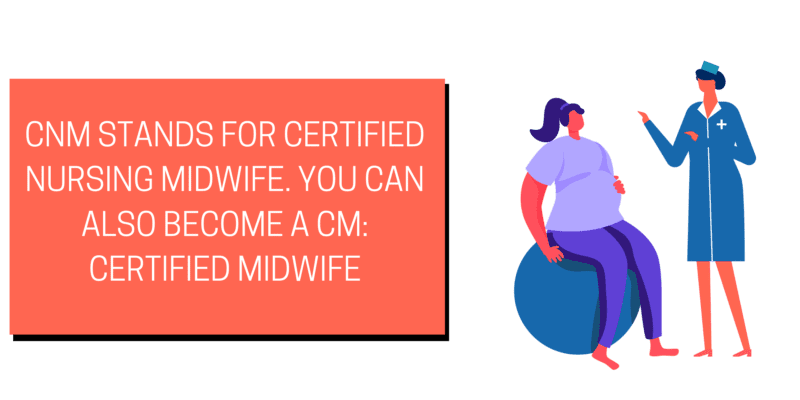Nursing is an invaluable career that gives qualified workers opportunities to treat patients and clients when they most need assistance. After completing a training program, or earning a degree, nurses can build a life for themselves that is rewarding and pays more than many jobs in the American economy.

If you’re committed to earning a nursing certification, you’ve come to the right place. It might seem overwhelming if you’re beginning the hunt for a pathway in nursing, but at Best Health Degrees, we’re here to make your life easier.
We’ve dedicated our website to showing you different options within nursing, answering common questions about the field, providing resources to enhance your understanding, and ranking available degree programs. By using our content you can find the best choice in nursing for you, and get a leg up on your competition in many ways.

Nursing is hard work. It involves intense time commitments: including months or years of study. After you earn a certification or license in the field, you’ll be expected to work long hours. You’ll constantly be on your feet, need a good deal of physical strength, and an upbeat attitude in complex, difficult circumstances. Nurses must be comfortable working with patients who are dealing with severe medical issues, have sustained gruesome injuries, and who need help completing essential bodily functions and care: like going to the bathroom and bathing.
Skip To
- What is a Certified Nursing Midwife? What Do Certified Nursing Midwives Do?
- How Do You Become a CNM? What are the Available CNM Degree Programs? What Do You Study in CNM Programs?
- Ask Yourself and Consider the Following About Your CNM Education and Career
- How Can We Help You In Your Nursing Education and Career?
- What Can You Expect to Earn as a CNM? Where Do CNMs Make the Most Money? In the Coming Years, What’s Expected For CNM Employment?
Being a nurse also requires the diligent pursuit of education, training —and if you want to advance — new certifications in the field. It’s arduous but fulfilling. Nurses often report high job satisfaction, a rarity in the overall American economy. If you want to build transferrable skills that have real utility while building close relationships with coworkers, this is a great career.
Nursing as a profession is well over a thousand years old. As The Roman Empire rapidly expanded its territory, it strove to build hospitals in all the towns under its control. Their expansion created an intense demand for nurses. Today, nursing — along with the overall medical field — is steadily growing, and expected to add hundreds of thousands of nurses in the coming years.
First things first: if you want to be a nurse, you have to choose a career in the field, then figure out what you need to do to qualify for it. You can look through our content to see the available roles and what’s required to reach them (more on that later). However, in this guide, we’re going to look at one position in the field: working as a Certified Nursing Midwife. To do so, you’ll need to earn a Certified Nursing Midwife Degree.
In this guide we’ll look at what Nursing Midwife’s do, what the degrees to become one entail, how to go about picking a program, how we can help you, and what employment and earnings are like once you become a Nursing Midwife.

Let’s begin:
What is a Certified Nursing Midwife? What Do Certified Nursing Midwives Do? Where Do CNMs Work?
Certified Nursing Midwives (CNMs) can be most closely compared to OB/GYN doctors, although their approach and training are different. They do far more than deliver babies. CNMs help with family planning, do gynecological checkups, and provide prenatal care. All of this builds towards assisting mothers as they give birth to their babies naturally and safely. They monitor and manage labor, and can work with doctors to facilitate C-section births.
Here’s a more complete look at CNM duties:
- Offering primary and specialty medical care for women. This encompasses physical examinations, diagnosing, treating, and handling medical conditions. In some states you’ll also be qualified to prescribe medicine.
- Treating your patients’ male partners sexually transmitted diseases when necessary.
- Counseling and educating partners and patients.
- Offering care for newborns in their first 28 days of life.
- Providing care and support during perimenopause and menopause.
Many of these duties can be performed with women and their partners when they’re not pregnant, or after a pregnancy. When you’re working with pregnant women, you can be called upon to:

- Take care of pregnancies through monitoring the health of the soon-to-be mother and the unborn baby.
- Offering counseling, education, and prenatal care that’s specifically calibrated to each mothers’ needs and health.
- Helping during labor and delivery.
- Giving follow-up care to mothers after their babies are born, including advice on breastfeeding and caring for their newborns.
CNMs are different than Labor and Delivery Nurses. L&D Nurses are Registered Nurses who monitor vital signs and care for laboring mothers. However, once it’s time for mothers to deliver their babies, L&D nurses call a doctor and relinquish their duties. CNMs do not.
In your research and pursuit of these degrees, you might see Certified Midwives (CMs) as another job title. CMs are also referred to as Licensed Midwives. They only need Bachelor’s degrees and are paid far less than CNMs. Also, CNMs can receive licensure in all states and prescribe medication, whereas CMs cannot.
Also, consider the different environments midwives work in. According to a 2007 survey by the American College of Nurse-Midwives here are the most common settings where they can be found:
- Hospital/Medical Center 32.7%
- Physician Practice 30.5%
- Community Health 8.5%
- Academic Institution 8.4%
- Nurse Practitioner Health Agency 4.1%
- Government/Military 3.6%
- Own Practice 3.3%
- Midwife Practice 3.1%
- Consultant 0.3%
- Other 5.5%
Let’s move on to the practical requirements of obtaining a CNM licensure:

How Do You Become a CNM? What are the Available CNM Degree Programs? What Do You Study in CNM Programs?
CNMs are Advanced Nurse Practitioners. To become a CNM, you’ll first need to become a Registered Nurse (RN). Becoming an RN requires obtaining a Bachelor’s degree in Nursing (BSN) and RN certification. You must pass an exam offered by the National Council Licensure Examination (NCLEX-RN) in addition to your Bachelor’s degree. While some RNs have only earned an associate degree, you’ll likely need a Bachelor’s to become a CNM, or at least attend a bridge program that prepares you for your next degree. That’s because, as of 2010, the American College of Nurse-Midwives (ACNM) decided that CNMs need a Master’s degree from an accredited institution to become a CNM or a Certified Midwife (CM). They’ll also need a certification from the American Midwifery Certification Board (AMCB).
To qualify for a graduate nursing program, you’ll need at least a year of experience working as an RN.
The real meat of becoming a CNM is completed in a graduate program. Over 80% of CNMs hold a graduate degree, and approximately 5% have doctoral degrees. The rest of the practicing CNMs were grandfathered, having entered the field before a graduate degree was required.
Make sure the Accreditation Commission for Midwifery Education (ACME) accredits any graduate program you’re considering. There are approximately 40 ACME-accredited programs offering students either a post-graduate certificate, master’s, or doctoral degree in midwifery. They generally can be completed in 24 months, although some accelerated programs are available for nurses with post-baccalaureate degrees.
To get into these programs you’ll need to fulfill the following prerequisites (in addition to a Bachelor’s degree and RN license):
- Letters of recommendation
- Courses in areas like statistics and health assessment
- GPA 3.0 or higher
- Clinical portfolio
- Proof of malpractice insurance
- CPR certification
Some of the courses you’ll study during your nursing midwife degree program include:
- Nursing care across the lifespan
- Genetics and genomes
- Evidence-based nursing
- Health promotion
- Women’s health for nurse-midwives
- Epidemiology
- Technology in nursing
- Advocacy in nursing
- Community health
- Advanced health assessment
- Evolution of midwifery
- Antepartal care
- Mother-baby dyad

After completing an ACME-accredited program, aspiring midwives need to take a national certification exam. The AMCB offers this exam. It’s a 175-question multiple-choice exam that’s computer-based. It’s offered at many sites around the country five days a week. You have four hours to complete it. There’s a fee for the exam. You can sit up to four times to pass the exam. After passing, you can seek certification, which must be renewed every five years.
To renew your CNM certification you can either:
- Take three AMCB-approved certificate maintenance modules (Antepartum and Primary Care [PC] of the Pregnant Woman, Intrapartum/Newborn and Postpartum, Gynecology, and PC of the Well-Woman), take 20 contact hours of approved continuing education units, and pay for/fill out a renewal application
- Retake the ACMB certification examination and submit a renewal application
US News & World Report has ranked the top 10 programs for midwifery. They are offered at the following schools:
- University of California-San Francisco
- University of Michigan-Ann Arbor
- Vanderbilt University (Nashville, TN)
- Oregon Health and Science University
- University of Minnesota-Twin Cities
- Yale University
- University of New Mexico
- University of Pennsylvania
- University of Utah
- Baylor University (Dallas, TX)
Let’s move on to the process of deciding whether midwifery education is right for you, and picking a specific program:
Ask Yourself and Consider the Following About Your CNM Education and Career
- Are you qualified to start a CNM program?
- We’ve gone over the prerequisites. Study them and make sure you can fulfill them. By speaking to qualified midwives, or the support staff at specific programs you can further understand if you qualify, or what you still need to do if you don’t.
- What are your career goals? Do you want to become a CNM? Would you like to become a CM instead? Are you interested in another area of nursing or medicine?
- Licensed Midwives, also known as CMs, don’t necessarily need a nursing degree, and they aren’t RNs. They earn far less than CNMs, but it’s another route to begin working as a midwife. In 2018 seven colleges were offering these programs. Some of these programs can lead to a master’s degree in midwifery. Some will let you work as a CM in your state, but not elsewhere. Do your due diligence and study your options closely.
- What is your current educational and career experience in medicine and nursing? How has it readied you to be a CNM?
- Have you earned your Bachelor’s degree and RN license? Have you been working as an RN?
- If not you’ll need to do that to qualify for a CNM program.
- In some cases, there are bridge programs for RNs who earned their RN license with an Associate Degree in Nursing (ADN). So while Bachelor’s are often necessary, they aren’t always required.
- If you’re starting from scratch, consider the time requirements. Becoming a CNM without any credentials can take between five and eight years of study, training, and work.
- Where do you want to live and work after completing your CNM education and certification?
- CNMs can practice all over the country, but there are areas with more job opportunities and higher pay. By studying at a program in one of those areas you can improve your chances of working in a state with more midwifery positions and better salaries.
These are just a few of the questions and considerations that you should explore during your hunt for your midwifery education and career. Answering these questions about your CNM pathway and in regards to specific midwifery programs will be instrumental to your success in the field.
Now let’s look at how we can assist you in your search for a career in nursing:

How Can We Help You In Your Nursing Education and Career?
Best Health Degrees was created to help you find a specific career in nursing and medicine, and decide whether a career in the field is right for you. To accomplish those goals, we’ve created several forms of content to guide you. Do yourself a favor and revisit our site frequently, as we’ll be adding and updating content consistently.
Some of the work we’ve done includes ranking degree programs, including on-campus, traditional programs, and online offerings. We’ve written resources to guide you in your search for specific roles in nursing. There are more roles in nursing and medicine than you might know, and all require completing appropriate training, certifications, degrees, diplomas, along with other credentials and work experiences. We aim to show you how to reach these roles in practical, concise pieces that demystify this complex, evolving field.
We’ve answered common queries that people have about different roles in nursing, the differences between them, the responsibilities of specific functions, among other questions. We’ve also written guides like this one, for in-depth explorations of particular roles in the field.
If you find any institution, university, or other organization through our content that you feel is a good fit for you, you can help yourself significantly by reaching out to their support staff directly. You’ll likely find dedicated professionals who are eager to help you figure out if you’re a good fit, whether you qualify for their nursing programs, what you can do to better your chances of acceptance and answer any other questions you might have. You can also read reviews from further attendees, and make sure the program you’re considering complies with local and national accrediting agencies.
Here’s some of the content we’ve developed to help you:
Rankings
- 25 Best Master’s in Healthcare Administration
- 15 Best Online Master’s in Healthcare Administration
- 15 Best Online MSN Degree Programs
- 25 Online Master’s in Nursing and Healthcare Informatics
- 15 Best Master’s in Nursing and Healthcare Informatics
- 15 Best Online BSN Degree Programs
- 25 Best Traditional BSN Degree Programs
Resources
- What Can I Do with a Bachelor’s in Nursing?
- What Can I Do with a Master’s of Science in Nursing?
- What Can I Do with a Master’s in Health Informatics?
- What Can I Do with a Master’s in Healthcare Administration?
Common Questions
- How Do You Become a Certified Nurse Midwife?
- How Do You Become a Neonatal Nurse?
- How Do You Become a Nurse Educator?
- What is a Certified Nurse Midwife?
- What is a Lactation Consultant?
- What is a Neonatal Nurse?
- What Types of Nursing Degrees Can I Get?
Before we finish up, let’s inspect the earnings and employment opportunities for CNMs:

What Can You Expect to Earn as a CNM? Where Do CNMs Make the Most Money? In the Coming Years, What’s Expected For CNM Employment?
CNAs are advanced nurses. They receive much higher earnings than the average nurse and have intricate responsibilities. They earn degrees and training that are longer and more in-depth than RNs.
Before we get into their earnings and employment, let’s look at information about nursing employment overall. The following news comes from the United States Bureau of Labor Statistics:
- In 2018, nurses made a median wage of $71,730 each year, or $34.48 per hour.
- In 2018 there were 3,059,800 employed nurses.
- Nursing employment was expected increase 12% between 2018-28. This would mean 371,500 new roles in the field.
BLS also notes the following about CNMs:
- In May 2018 there were approximately 6,250 CNMs.
- The median wage for CNMs was $103,770, or $49.89 per hour.
- In May 2018 the bottom 10 percentile of CNMs made $70,100 annually or $33.70 per hour. The top 10 percentile earned $151,070, or $72.63 per hour.
Industries with the highest employment in the field were:
- Offices of Physicians: 2,560 roles, $49.65 hourly mean wage, $103,260 annual mean wage
- General Medical and Surgical Hospitals: 1,730 jobs, $54.52 hourly mean wage, $113,400 annual mean wage
- Outpatient Care Centers: 1,130 jobs, $55.02 hourly mean wage, $114,450 annual mean wage
- Offices of Other Health Practitioners: 420 positions, $38.01 hourly mean wage, $79,070 annual mean wage
- Colleges, Universities, and Professional Schools: 130 jobs, $49.77 hourly mean wage, $103,520 annual mean wage
Highest paying roles in the field were:
- Local Government, excluding schools and hospitals (OES Designation): 80 jobs, $74.83 hourly mean wage, $155,650 annual mean wage
- Management of Companies and Enterprises: 40 positions, $58.02 hourly mean wage, $120,690 annual mean wage
- Outpatient Care Centers: 1,130 jobs, $55.02 hourly mean wage, $114,450 annual mean wage
- General Medical and Surgical Hospitals: 1,730 roles, $54.52 hourly mean wage, $113,400 annual mean wage
- Colleges, Universities, and Professional Schools: 130 jobs, $49.77 hourly mean wage, $103,520 annual mean wage
States with the highest employment of CNMs were:
- California: 700 jobs, $67.30 hourly mean wage, $139,990 annual mean wage
- New York: 450 roles, $52.96 hourly mean wage, $110,150 annual mean wage
- Georgia: 370 jobs, $52.71 hourly mean wage, $109,640 annual mean wage
- Florida: 330 positions, $42.34 hourly mean wage, $88,060 annual mean wage
- Pennsylvania: 320 roles, $46.50 hourly mean wage, $96,710 annual mean wage
States with the highest pay for CNMs were:
- California: 700 jobs, $67.30 hourly mean wage, $139,990 annual mean wage
- Massachusetts: 250 roles, $57.40 hourly mean wage, $119,380 annual mean wage
- Maryland: Unknown roles, $55.50 hourly mean wage, $115,440 annual mean wage
- Arizona: 100 positions, $55.24 hourly mean wage, $114,900 annual mean wage
- New Jersey: 180 jobs, $54.80 hourly mean wage, $113,980 annual mean wage
BLS also lumps CNMs in with Nurse Anesthetists and Nurse Practitioners in its prediction of employment change between 2018-28. In 2018 it found there were 240,700 of these roles. Between 2018-28 they predict there will be a 26% growth in the field, leading to 62,000 new jobs.
We hope you’ve found this guide instructive, demystifying, and inspiring for your career in nursing. Looking forward to seeing you back soon!